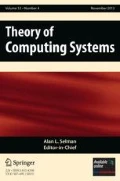Abstract
In the theory of algorithmic randomness, one of the central notions is that of computable randomness. An infinite binary sequence X is computably random if no recursive martingale (strategy) can win an infinite amount of money by betting on the values of the bits of X. In the classical model, the martingales considered are real-valued, that is, the bets made by the martingale can be arbitrary real numbers. In this paper, we investigate a more restricted model, where only integer-valued martingales are considered, and we study the class of random sequences induced by this model.
Similar content being viewed by others
References
Azuma, K.: Weighted sums of certain dependent random variables. Tohoku Math. J. 19, 357–367 (1967)
Bienvenu, L., Merkle, W.: Constructive equivalence relations for computable probability measures. Ann. Pure Appl. Log. 160, 238–254 (2009)
Billingsley, P.: Probability Measure, 3rd edn. Wiley Series in Probability and Mathematical Statistics. Wiley, New York (1995)
Chalcraft, A., Dougherty, R., Freiling, C., Teutsch, J.: How to build a warped online casino. Manuscript
Doob, J.L.: Stochastic Processes. Wiley, New York (1953)
Downey, R.G., Hirschfeldt, D.R.: Algorithmic Randomness and Complexity. Theory and Applications of Computability. Springer, New York (2010)
Downey, R.G., Griffiths, E.J., Reid, S.: On Kurtz randomness. Theor. Comput. Sci. 321(2–3), 249–270 (2004)
Hitchcock, J.M., Lutz, J.H.: Why computational complexity requires stricter martingales. Theory Comput. Syst. 39, 277–296 (2006)
Hoeffding, W.: Probability inequalities for sums of bounded random variables. J. Am. Stat. Assoc. 58, 13–30 (1963)
Kakutani, S.: On equivalence of infinite product measures. Ann. Math. 49, 214–224 (1948)
Kurtz, S.: Randomness and genericity in the degrees of unsolvability. PhD thesis, University of Illinois at Urbana (1981)
Martin-Löf, P.: The definition of random sequences. Inf. Control 9, 602–619 (1966)
Merkle, W., Miller, J.S., Nies, A., Reimann, J., Stephan, F.: Kolmogorov-Loveland randomness and stochasticity. Ann. Pure Appl. Log. 138(1–3), 183–210 (2006)
Muchnik, A.A., Semenov, A., Uspensky, V.: Mathematical metaphysics of randomness. Theor. Comput. Sci. 207(2), 263–317 (1998)
Nies, A.: Computability Randomness. Oxford Logic Guides, vol. 51. Oxford University Press, Oxford (2009)
Ross, S.M.: Stochastic Processes, 2nd edn., Wiley Series in Probability and Statistics: Probability and Statistics. Wiley, New York (1996)
Schnorr, C.-P.: A unified approach to the definition of random sequences. Math. Syst. Theory 5, 246–258 (1971)
Schnorr, C.-P.: Zufälligkeit und Wahrscheinlichkeit. Eine algorithmische Begründung der Wahrscheinlichkeitstheorie. Lecture Notes in Mathematics, vol. 218. Springer, Berlin (1971)
Shen, A.: On relations between different algorithmic definitions of randomness. Sov. Math. Dokl. 38, 316–319 (1989)
Soare, R.I.: Recursively Enumerable Sets and Degrees. Perspectives in Mathematical Logic. Springer, Berlin (1987), A study of computable functions and computably generated sets
Vovk, V.: On a criterion for randomness. Sov. Math. Dokl. 294(6), 1298–1302 (1987)
Wang, Y.: Randomness complexity. PhD thesis, Mathematisch-Naturwissenschaftlichen Gesamtfakultät, Universität Heidelberg (1996)
Wang, Y.: A separation of two randomness concepts. Inf. Process. Lett. 69(3), 115–118 (1999)
Author information
Authors and Affiliations
Corresponding author
Rights and permissions
About this article
Cite this article
Bienvenu, L., Stephan, F. & Teutsch, J. How Powerful Are Integer-Valued Martingales?. Theory Comput Syst 51, 330–351 (2012). https://doi.org/10.1007/s00224-011-9362-3
Published:
Issue Date:
DOI: https://doi.org/10.1007/s00224-011-9362-3




